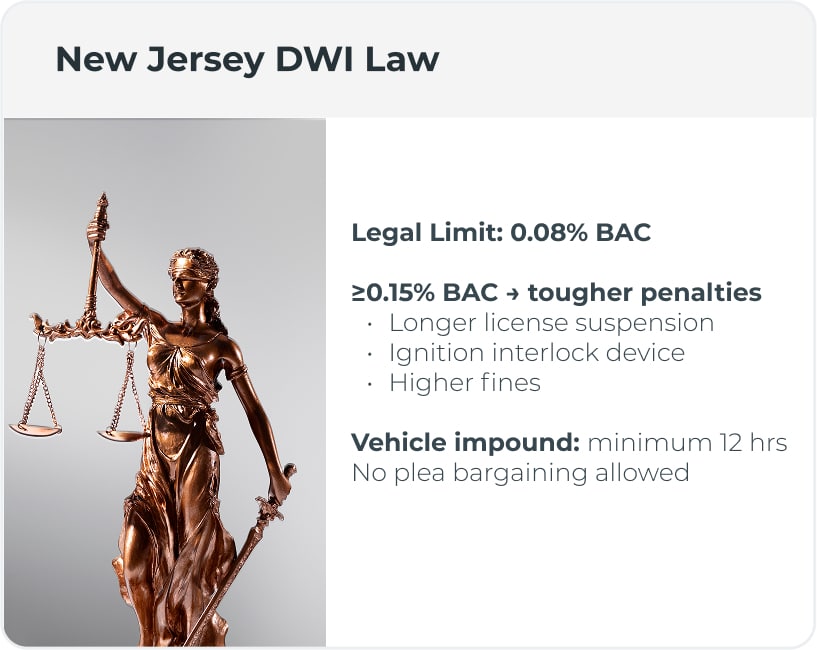Gloucester County Double Arrest Shows Why New Jersey Takes DWI Seriously
When Helping a Friend Goes Wrong: Woman Faces DWI Charges After Driving to Police Station While Twice Over Legal Limit

Instances like these not only emphasize the danger of drunk driving but also that the state of New Jersey is serious about DWI offenses. The state has stringent punishments for DWI offenses, including suspension of license and fines. Prevention classes and mandatory driver’s ed are used to prevent impaired driving and promote road safety.
For those accused of DWI, though, the effects can be life-changing. Our office offers practiced defenses for those accused of DWI and all criminal-related issues. We guide the client through the legal system, secure their legal rights, and advocate for the strongest possible result .
New Jersey DWI Law: BAC Thresholds and Mandatory Penalties

For those with 0.15% BAC or higher, the state law sets tougher punishments. Increasing license suspension for longer durations, requiring ignition interlock use, and additional fines. It is to sanction higher-risk violators and prevent repeat offenders.
Moreover, vehicle impounding is mandated by N.J.S.A. 39:5-30.1. When arrested for DWI, the driver ‘s car is usually towed for at least 12 hours. It thwarts immediate recidivism and highlights the urgency of drunk driving.
Ignition interlocks are another prominent component of the State of New Jersey’s DWI system. Based on the BAC level of impairment and whether they had previous offenses, motorists are required to have an ignition interlock system installed in their cars for a specified length of time . The system takes a breath sample prior to engine start-up and is an additional continuous deterrent to drunk driving. Suspensions of licenses take place concurrently with these installations, so individuals must fulfill them both before they can resume normal driving.
Evidence Suppression and Constitutional Defenses in New Jersey DWI Cases
Constitutional Protection of DWI Defense Lawyers
Defendants charged with DWI in the State of New Jersey are entitled to all of the guarantees of the U.S. Constitution. The Fourth Amendment prohibits illegal searches and seizures, including road stops and arrests. Tests conducted thereafter must be based upon reasonable suspicion or probable cause. If officers stray from those guidelines, the evidence may become subject to suppression. The Fifth Amendment is for protection against self-incrimation , not merely for custodial interrogation, but for certain compelled statements during the DWI hearing. Defense counsel typically examines whether Miranda warnings were issued when they should have been and whether a defendant’s constitutional protections were observed at each step.
Breath Test Reliability Specification for Alcotest 7110
Breath test results constitute the foundation of most DWI cases in the state of New Jersey, and their admissibility is tightly regulated. Alcotest 7110 devices under the New Jersey Administrative Code 13:51 require strict calibrating and maintenance procedures. Calibration at regular intervals, operator certification, and the use of standard test procedures are requirements for admissibility in court. Any deviation—expired calibration certificates, for instance, or operators not sufficiently trained—can be the subject of challenging the results of the BAC.
The Alcotest 7110 DWI machine is being phased out, they are still using it but they are also using a new machine the 9510 which has not been deemed scientifically reliable by the New Jersey Supreme Court. They should be having hearings to determine that early next year.
Sobriety Tests and Standards of Evidence
Besides breath tests, officers may use field sobriety tests (FST) like the walk-and-turn, the one-leg stand, or the horizontal gaze nystagmus. But again, they are not infallible. For FST evidence to be admissible under the law of New Jersey, police must use standard procedures and disclose circumstances at the scene that might have affected the test results. Defense attorneys often emphasize environmental issues such as bad lighting, uneven ground, medical problems, or exhaustion, all of which can invalidate the test.
Defending Multiple DWI Cases from the Same Incident
Instances such as the strange double arrest in Gloucester County bring into focus another dimension of complicated cases: simultaneous DWI charges out of the same occurrence. Defending such matters necessitates keen examination of the facts, actual and perceived conflict of interests , and a rigid adherence to professional ethics. Counsel must be sure that representation does not offend the rights of either defendant, and in certain instances, representation may need to be separated. These matters also raise systemic questions of proportionality of charges and prosecutorial discretion, thus making them uniquely complicated to defend.
Administrative Penalties and Court Procedures Following DWI Arrest
Revoking License and Administrative Penalties
Under N.J.S.A. 39:4-50 , DWI offenses for violators extend beyond fines and costs in court to mandatory suspensions of licenses. The suspension period varies depending upon the degree of BAC of the violator and upon prior convictions. First offenders with 0.08% to 0.10% BAC face less severe suspension, for example, while those with 0.15% BAC and above may lose their license for a longer duration and are mandated to fit an ignition interlock system. Repeat offenders face progressively harsher suspensions, fines, and even mandatory terms in jail .
Proceedings for DWI in Municipal Court
DWI matters in the state of New Jersey are tried in the state’s municipal courts under N.J. Court Rules 7:1. DWI cases are distinct from superior court cases in that DWI is not itself criminal, but rather a traffic offense that is nonetheless potentially serious. The proceeding is usually accompanied by an initial appearance, pretrial conferences, and trial unless settlement occurs at an earlier hearing. Municipal prosecutors are required to maintain strict evidentiary possession, and defendants may object to the validity of the stop, the validity of field sobriety tests, and the believability of breathalyzer results.
Plea Bargaining Options and Alternative Resolutions in DWI Cases
New Jersey DWI law underwent a significant transformation in February 2024. For the first time in over 50 years, plea negotiations in DWI cases are now back on the table. The state legislature amended N.J.S.A. 39:4-50 to explicitly allow prosecutors to recommend plea agreements when the facts of a case support it. The New Jersey Supreme Court removed its longstanding prohibition, ending what had been a firm ban dating back to 1990.
What does this mean for someone facing DWI charges? Prosecutors can now offer reduced charges—often to reckless or careless driving—depending on the circumstances. They’ll look at factors such as the strength of your evidence, your driving record, your BAC reading, and whether there were any problems with how the stop or the tests were conducted. Maybe the breathalyzer wasn’t properly calibrated. Maybe the officer didn’t follow protocol during field sobriety tests. These issues matter more than ever now.
That said, prosecutors aren’t required to negotiate. They have complete discretion over whether to offer a plea deal. Your defense attorney needs to give them good reasons why a reduction makes sense. This might involve pointing out weaknesses in the state’s case or constitutional violations during your arrest.
Even if plea bargaining isn’t an option in your case, other paths exist. You can challenge the evidence itself, deal with related charges separately, or push for sentencing alternatives. Courts may consider extended alcohol education programs, community service, or adjusted ignition interlock terms instead of longer license suspensions. The key is having an experienced attorney who knows how to navigate these options and fight for the best possible outcome in your specific situation.
Insurance Penalties and SR-22 Form Requirement
A DWI conviction in New Jersey almost always has lasting financial consequences. Drivers can anticipate large increases in auto insurance rates and surcharges by the New Jersey Motor Vehicle Commission. Some drivers can even be required to furnish an SR-22 certificate of financial responsibility, also called an SR-22 form, in order to drive again. An SR-22 is a certificate of insurance that proves a driver has the minimum required auto insurance coverage mandated by the state.
Community-Based Prevention and New Jersey’s Multi-Layered Approach to Drunk Driving
Statewide and Local Programs
New Jersey has fortified its drunk driving prevention strategy with legislative changes as well as local community programs. State-wide programs focus on education, enforcement, and deterrence, with local authorities often unveiling programs geared specifically to their citizens. The programs demonstrate a two-part strategy: keeping offenders off the roadways and treating the underlying problems that contribute to repeat offending.
Local Programs and Community-Based Solutions
Some local government authorities have even taken innovative prevention measures that go even beyond legal law enforcement. An example is that of Washington Township, which has offered citizens free or reduced-price Uber rides over holidays in order to reduce the danger of drunk driving. Programs of this sort complement legal enforcement by offering practical alternatives for individuals who otherwise would attempt a drive under the influence.
Ignition Interlocks for Repeat Offenders

Alcohol Education and Treatment Court Alternatives
Rehabilitation is also strongly urged by the state of New Jersey. Defendants are typically sentenced to mandatory alcohol education and screening at the Intoxicated Driver Resource Center (IDRC ). Repeat offenders or offenders whose crimes for drugs are of the higher severity may also qualify for treatment court programs, including structured supervision, counseling, and support to substitute for jail time. These programs reflect that the state realizes that drunk driving problems often need to be addressed through treating underlying addiction and dependency over the long term.
Don’t Let Poor Decisions Lead to Double Trouble. Get Expert DWI Defense Now
For first-time DWI offenders, the penalties are based on the driver’s Blood Alcohol Concentration (BAC) at the time of the offense. A BAC of .08% to .10% requires the installation of an ignition interlock device for 3 months. The driver’s license is suspended until the device is installed . For first-time offenders with BAC of 0.10 to 0.15% an ignition interlock device must be used from 7 months to a year and the license is suspended until the device is up and running . The penalties for a first DUI offense typically include a fine ranging from $250 to $ 500, mandatory attendance at an Intoxicated Driver Resource Center for 12 to 48 hours over two consecutive days, and a possible jail sentence of up to 30 days. Additionally, a DWI can lead to increased insurance premiums, as well as extra fees and charges.
A second DWI offense is punishable by license suspension of between 1 year and 2 years and an interlock ignition device is required for 2 to 4 years. For a third or subsequent DWI offense, the period of license suspension is 8 years. Violations result in mandatory interlock device installation for 2 to 4 years. At Tormey Law Firm LLC, we understand the serious nature of these penalties. Contact our experienced New Jersey DWI defense team today at (201) 556-1570. Don’t let a DWI charge derail your future. We’re here to guide you through the legal process and fight for your rights every step of the way.

